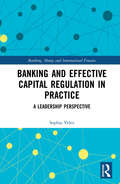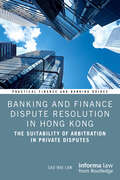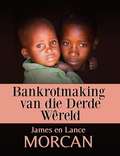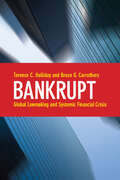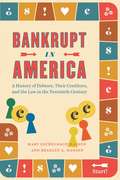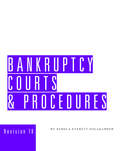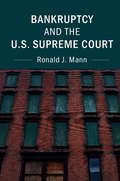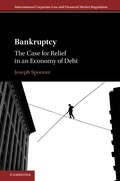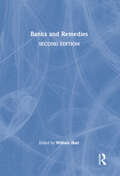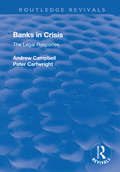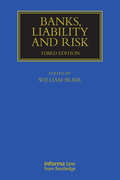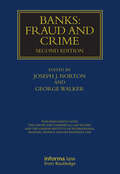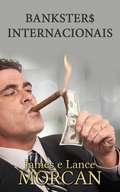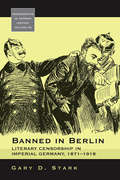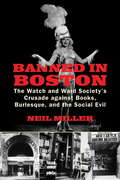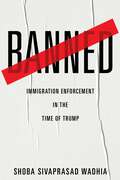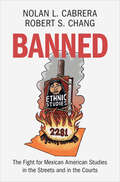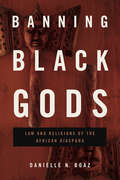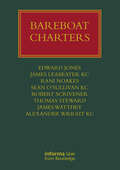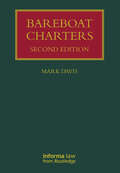- Table View
- List View
Banking and Effective Capital Regulation in Practice: A Leadership Perspective (Banking, Money and International Finance)
by Sophia VelezDue to a historical lack of attention to the importance of modelling, measuring and managing risk, senior bank leaders are struggling to implement unified practices within their financial institutions that could address the gaps posed by risky management behaviour, rogue trading, liquidity crises, prohibited investments in mortgage-backed securities, and default risks aligned with loans. This book discusses the theories at play between bank agents (bank managers) and their principals (shareholders), a topic which has gained importance as a result of the banking crisis, and similarly, governed the need for more efficient risk management and ethical managerial practices. The author worked with a senior bank leadership team to identify and describe effective capital regulation practices that can lead to a reduction in loss and risky management behavioural practices. The book offers consensus on a number of activities that bank managers can implement to address bank risk. It analyses the relevant factors that determine the necessity for banking regulation and the important role of regulation in managing banking crises. The author’s analysis of the important regulatory aspects in developed countries such as the US, offers a useful conceptual framework for creating an adequate banking regulatory environment in developing countries. This book offers an original contribution to the field of banking that undergraduate, masters, PhD students, academics and researchers can use to gain a deeper understanding of the constructs at play in the banking industry.
Banking and Finance Dispute Resolution in Hong Kong: The Suitability of Arbitration in Private Disputes (Practical Finance and Banking Guides)
by Sau Wai LawThis book examines the concept of ‘naming, blaming, claiming’ in the application of arbitration for private banking dispute resolution. The author focuses on examining this issue using Hong Kong as a case in point, blending theory and empirical evidence to unveil how disputes are resolved within the banking and finance industry, which will enable them to explore possible effective and efficient mechanisms to resolve financial disputes. The book offers a comprehensive review of the laws and regulations governing the private banking industry in Hong Kong and selected jurisdictions, as well as how they are implemented. It examines the clients’ perceptions through an innovative methodology for empirical studies. Describing how clients react to the laws and regulations and the potential adverse impacts to the stability of the banking industry, the author identifies possible factors that could trigger another financial crisis. Synthesising his analysis, the author proposes newly discovered self-corrective mechanisms embedded among clients and concludes with policy recommendations. Directly relevant to banking practitioners, particularly legal and compliance departments, and senior management, the book is also written for legal professionals interested in the practices of dispute resolution in banking and finance. Additional readerships will include bank regulators, government officials, policy makers, researchers, and those involved in courses in banking and financial law, as well as Arbitration and Dispute Resolution.
Bankrotmaking van die Derde Wêreld
by Elmarié Smal James Morcan Lance MorcanBankrotmaking van die Derde Wêreld is toegewy aan die armes in vergete plekke van die wêreld. Dit vra of die Wêreldbank, die Internasionale Monetêre Fonds, die Verenigde State se Agentskap vir Internasionale Ontwikkeling en ander groot internasionale hulporganisasies die wêreld se armste mense help of belemmer. In hierdie boek word ook gevra of die hulppakkette wat verskaf word, reg is en of dit swendelary is wat ontwerp is om Derde Wêreldlande te onderwerp. Dit stel die kultuur van korrupsie binne die voorgenoemde hulporganisasies bloot en die arrogansie waarmee hulle hul derde wêreldkliënte behandel. ' Die Morcans onthul dat daar 'n onheilspellende verborge agenda is waarvolgens die 'vrygewigheid' wat deur internasionale hulporganisasies uitgebrei word om die ontwikkeling van die Derde Wêreld te ondersteun en om verligting te bied in die geval van natuurrampe, met ernstige bymotiewe kom. Bymotiewe wat ontwerp is om kwesbare nasies te kul. Die leser word herinner aan die ekonomiese treffers wat gewild geword het in John Perkins se topverkoper van 2004. Bekentenisse van 'n Ekonomiese Sluipmoordenaar is nog steeds lewendig en goed - in Afrika in die besonder. By die skryf van hierdie boek is die skrywers gemotiveer deur een sieklike statistiek: 21, 000 mense sterf elke dag van hongersnood. Dit is een persoon elke vier sekondes! Meer siek is die feit dat sulke sterftes onnodig is aangesien daar meer as genoeg rykdom in die wêreld is, want almal moet ten minste die basiese lewensbehoeftes ontvang en daar is meer as genoeg in die Derde Wêreld om dit self organies te onderhou. Teen die tyd dat jy aan die einde van hierdie boek kom, sal jy sien dat daar soveel rykdom in die Derde Wêreld voorkom soos in die Eerste Wêreld. Trouens, terme soos 'Derde Wêreld' en 'verarmde nasies' is in wese verkeerde benamings, omdat dit impliseer dat rykdom en hulpbronne beperk is.
Bankrupt
by Terence C. Halliday Bruce G. CarruthersThe Asian Financial Crisis dramatically illustrated the vulnerability of financial markets in emerging, transitional, and advanced economies. In response, international organizations insisted that legal reforms could help protect markets from financial breakdowns. Sitting at the nexus between the legal system and the market, corporate bankruptcy law ensures that the casualties of capitalism are treated in an orderly way. Halliday and Carruthers show how global actors-including the IMF, World Bank, UN, and international professional associations-developed comprehensive norms for corporate bankruptcy laws and how national policymakers responded in turn. Drawing on extensive fieldwork in China, Indonesia and Korea, the authors reveal how national policymakers contested and negotiated domestic laws in the context of global pressures. The first study of its kind, this book offers a theory of legal change to explain why global/local tensions produce implementation gaps. Through its analysis of globalization, this book has lessons for international organizations and developing and transition economies the world over.
Bankrupt in America: A History of Debtors, Their Creditors, and the Law in the Twentieth Century (Markets and Governments in Economic History)
by Mary Eschelbach Hansen Bradley A. HansenIn 2005, more than two million Americans—six out of every 1,000 people—filed for bankruptcy. Though personal bankruptcy rates have since stabilized, bankruptcy remains an important tool for the relief of financially distressed households. In Bankrupt in America, Mary and Brad Hansen offer a vital perspective on the history of bankruptcy in America, beginning with the first lasting federal bankruptcy law enacted in 1898. Interweaving careful legal history and rigorous economic analysis, Bankrupt in America is the first work to trace how bankruptcy was transformed from an intermittently used constitutional provision, to an indispensable tool for business, to a central element of the social safety net for ordinary Americans. To do this, the authors track federal bankruptcy law, as well as related state and federal laws, examining the interaction between changes in the laws and changes in how people in each state used the bankruptcy law. In this thorough investigation, Hansen and Hansen reach novel conclusions about the causes and consequences of bankruptcy, adding nuance to the discussion of the relationship between bankruptcy rates and economic performance.
Bankruptcy Courts & Procedures
by Pamela Everett NollkamperBankruptcy Courts & Procedures is a comprehensive guide to the entire bankruptcy process, including involuntary, creditor and adversary proceedings. The book also lists fees, filing requirements, names, addresses and telephone numbers for every bankruptcy court in the nation. Written by Pamela Everett Nollkamper, a professional paralegal with decades of experience, Bankruptcy Courts & Procedures provides the tools necessary to guide you through your case whether you're new to the field or an experienced bankruptcy professional. Bankruptcy Courts & Procedures provides information necessary to file in every bankruptcy court nationwide, with filing requirements for all 50 states, the District of Columbia, Puerto Rico and the Virgin Islands.
Bankruptcy and the U.S. Supreme Court
by Ronald J. MannIn this illuminating work, Ronald J. Mann offers readers a comprehensive study of bankruptcy cases in the Supreme Court of the United States. He provides detailed case studies based on the Justices' private papers on the most closely divided cases, statistical analysis of variation among the Justices in their votes for and against effective bankruptcy relief, and new information about the appearance in opinions of citations taken from party and amici briefs. By focusing on cases that have neither a clear answer under the statute nor important policy constraints, the book unveils the decision-making process of the Justices themselves - what they do when they are left to their own devices. It should be read by anyone interested not only in the jurisprudence of bankruptcy, but also in the inner workings of the Supreme Court.
Bankruptcy: The Case for Relief in an Economy of Debt (International Corporate Law and Financial Market Regulation)
by Joseph SpoonerA decade after the Global Financial Crisis and Great Recession, developed economies continue to struggle under excessive household debt. While exacerbating inequality and political unrest, this debt - when combined with wage stagnation and a shrinking welfare state - has played a key role in maintaining economic growth and allowing households faced with rising costs of living to make ends meet. In Bankruptcy: The Case for Relief in an Economy of Debt, Joseph Spooner examines this economic model and finds it increasingly unsustainable. In a call to action to reduce debt burden, he turns to bankruptcy law, which is uniquely situated as a mechanism of social insurance against the risks of a debt-dependent economy. This book should be read by anyone interested in understanding the problem of consumer debt and how best to address it.
Bankrupts and Usurers of Imperial Russia
by Sergei AntonovAs readers of Russian literature know, the nineteenth century was a time of pervasive financial anxiety. Russians of all classes were enmeshed in networks of credit and debt, and borrowing and lending shaped perceptions of material and moral worth. Sergei Antonov recreates this imperial world of borrowers, bankrupts, lenders, and loan sharks.
Banks and Labor as Stakeholders: Impact on Economic Performance
by Kenichi Ueda Stijn ClaessensA report from the International Monetary Fund.
Banks and Remedies
by William Blair QcThis text looks at the options that the law provides, both domestically and internationally. It also explains the various opportunities available to reduce risk and organize and administer rescue packages for ailing institutions. This edition addresses the new civil procedures rules in England; arbitration in banking and finance; rescues; EC remedies and English law remedies.
Banks in Crisis: The Legal Response (Routledge Revivals)
by Andrew Campbell Peter CartwrightThis title was first published in 2002: A detailed and critical analysis of the various legal problems that arise when banks are in serious financial difficulty, Banks in Crisis offers an invaluable, international perspective on the concept and causes of bank failure. It takes an authoritative and much-needed look at a number of key issues including: - Effective bank regulation as an instrument in the possible prevention of banking crises, with particular reference to the role of the Financial Services Authority in the UK, and the impact of the Financial Services and Markets Act 2000 - The role of the Bank of England in the new regulatory landscape, with particular reference to its function as lender of last resort - The legal controls on those involved in the management of banks - Insolvency procedures and bank liquidation - The use of depositor protection schemes. By drawing conclusions and weighing up the methods available to promote stability, prevent failure and promote rescues where appropriate, Banks in Crisis is an essential read and a welcome addition to this crucial area of research.
Banks, Liability and Risk
by William Blair QcBanks, Liability and Risk, 3rd Edition, is a probing look at the risks faced by banks and other lending institutions, showing problems typically faced by these institutions and highlighting the legal remedies available, with copious references to case law and precedents. The nature of the risks and liabilities which banks are exposed to are continually changing. This new edition has been completely revised to incorporate these changes, so that you can provide your clients and colleagues with the most up-to-date advice.
Banks: Fraud And Crime (International Banking, Finance And Economic Law Series Set Ser.)
by Joseph J. Norton George A. WalkerBanks: Fraud and Crime explores the main issues which arise in bank fraud world-wide and looks at the possible options available for corrective action. A series of leading commentators examine the basic nature of bank fraud and financial crime, comparing the legal and regulatory framework in England to those in place in the USA and elsewhere. Banks: Fraud and Crime also takes a detailed look at the core issue of money laundering at a national, regional and international level as well as considering the many other complex issues arising from bank fraud and financial crime.
Bankster$ Internacionais
by James Morcan Lance Morcan Wesley LindquistBankster$ Internacionais identifica quem são os responsáveis pelos gigantescos golpes financeiros que separam os 1% superiores da população, quanto à renda, das pessoas comuns, ou os 99%. Os Barões do Dinheiro focalizados neste livro incluem os administradores dos mais altos níveis nos bancos de Wall Street, nos bancos centrais europeus, na Reserva Federal dos EUA e no Banco do Vaticano, bem como os membros das dinastias bancárias de elite, por exemplo as famílias Rothschild e Rockefeller. Bankster$ Internacionais revela os verdadeiros motivos da série de crises financeiras recentes. Esses motivos incluem: o mundo secreto do "black money" e do dinheiro do Velho Mundo onde a maioria dos ativos e renda permanece não declarada; o sistema dos bancos centrais e a verdadeira natureza da Reserva Federal, dos EUA; as atividades financeiras menos do que santas do Vaticano; as relações nem sempre benevolentes do FMI e do Banco Mundial com os países do Terceiro Mundo; as medidas de austeridade atualmente infligidas a nações vulneráveis como a Grécia; bem como a teoria de que o suprimento de dinheiro do mundo está essencialmente sendo criado do nada. Além de identificar problemas e expor a corrupção, Bankster$ Internacionais propõe ideias para criar um sistema econômico mais justo. Essas idéias incluem: criar bancos públicos; utilizar certos aspectos da banca islâmica que podem ser compatíveis com os sistemas bancários ocidentais; estudar se o capitalismo e o socialismo podem realmente funcionar em conjunto; discutir o caso de manter, mas reestruturar o capitalismo; considerar os méritos de uma renda universal; e prever a influência do ciber-dinheiro, ou criptomoedas, na economia mundial nos próximos anos. Embora os assuntos abordados possam ser problemas monetários, isso está na superfície ...
Banned In Berlin
by Gary D. StarkImperial Germany's governing elite frequently sought to censor literature that threatened established political, social, religious, and moral norms in the name of public peace, order, and security. It claimed and exercised a prerogative to intervene in literary life that was broader than that of its Western neighbors, but still not broad enough to prevent the literary community from challenging and subverting many of the social norms the state was most determined to defend. This study is the first systematic analysis in any language of state censorship of literature and theater in imperial Germany (1871-1918). To assess the role that formal state controls played in German literary and political life during this period, it examines the intent, function, contested legal basis, institutions, and everyday operations of literary censorship as well as its effectiveness and its impact on authors, publishers, and theater directors.
Banned in Boston
by Neil Miller"I want to be intelligent, even if I do live in Boston."--an anonymous Bostonian, 1929 In this spectacular romp through the Puritan City, Neil Miller relates the scintillating story of how a powerful band of Brahmin moral crusaders helped make Boston the most straitlaced city in America, forever linked with the infamous catchphrase "Banned in Boston." Bankrolled by society's upper crust, the New England Watch and Ward Society acted as a quasi-vigilante police force and notorious literary censor for over eighty years. Often going over the heads of local authorities, it orchestrated the mass censorship of books and plays, raided gambling dens and brothels, and utilized spies to entrap prostitutes and their patrons. Miller deftly traces the growth of the Watch and Ward, from its formation in 1878 to its waning days in the 1950s. During its heyday, the society and its imitators banished modern classics by Hemingway, Faulkner, and Sinclair Lewis and went to war with publishing and literary giants such as Alfred A. Knopf and The Atlantic Monthly. To the chagrin of the Watch and Ward, some writers rode the national wave of publicity that accompanied the banning of their books. Upton Sinclair declared staunchly, "I would rather be banned in Boston than read anywhere else because when you are banned in Boston, you are read everywhere else." Others faced extinction or tried to barter their way onto bookshelves, like Walt Whitman, who hesitantly removed lines from Leaves of Grass under the watchful eye of the Watch and Ward. As the Great Depression unfolded, the society shifted its focus from bookstores to burlesque, successfully shuttering the Old Howard, the city's legendary theater that attracted patrons from T. S. Eliot to John F. Kennedy. Banned in Boston is a lively history and, despite Boston's "liberal" reputation today, a cautionary tale of the dangers caused by moral crusaders of all stripes.
Banned: Immigration Enforcement in the Time of Trump
by Shoba Sivaprasad WadhiaWinner, 2020 Best Book Award, Law Category, given by the American Book FestExamines immigration enforcement and discretion during the first eighteen months of the Trump administrationWithin days of taking office, President Donald J. Trump published or announced changes to immigration law and policy. These changes have profoundly shaken the lives and well-being of immigrants and their families, many of whom have been here for decades, and affected the work of the attorneys and advocates who represent or are themselves part of the immigrant community. Banned examines the tool of discretion, or the choice a government has to protect, detain, or deport immigrants, and describes how the Trump administration has wielded this tool in creating and executing its immigration policy.Banned combines personal interviews, immigration law, policy analysis, and case studies to answer the following questions: (1) what does immigration enforcement and discretion look like in the time of Trump? (2) who is affected by changes to immigration enforcement and discretion?; (3) how have individuals and families affected by immigration enforcement under President Trump changed their own perceptions about the future?; and (4) how do those informed about immigration enforcement and discretion describe the current state of affairs and perceive the future? Shoba Sivaprasad Wadhia pairs the contents of these interviews with a robust analysis of immigration enforcement and discretion during the first eighteen months of the Trump administration and offers recommendations for moving forward.The story of immigration and the role immigrants play in the United States is significant. The government has the tools to treat those seeking admission, refuge, or opportunity in the United States humanely. Banned offers a passionate reminder of the responsibility we all have to protect America’s identity as a nation of immigrants.
Banned: The Fight for Mexican American Studies in the Streets and in the Courts
by Nolan L. Cabrera Robert S. ChangIn Banned, readers are taken on a journey through the intense racial politics surrounding the banning of Mexican American Studies in Tucson, Arizona. This book details the state-sponsored racism that led to the elimination of this highly successful program, and the grassroots and legal resistance that followed. Through extensive research and firsthand narratives, readers will gain a deep understanding of the controversy surrounding this historic case. The legal challenge successfully overturned the Arizona law and became a central symbol in the modern-day Ethnic Studies renaissance. This work is a must-read for anyone interested in understanding the power of community activism, the importance of fighting for educational equity, and why the example of Tucson created an alternative blueprint for how we can challenge states that are currently banning critical race theory.
Banning Black Gods: Law and Religions of the African Diaspora (Africana Religions)
by Danielle N. BoazBanning Black Gods is a global examination of the legal challenges faced by adherents of the most widely practiced African-derived religions in the twenty-first century, including Santeria/Lucumi, Haitian Vodou, Candomblé, Palo Mayombe, Umbanda, Islam, Rastafari, Obeah, and Voodoo. Examining court cases, laws, human rights reports, and related materials, Danielle N. Boaz argues that restrictions on African diaspora religious freedom constitute a unique and pervasive form of anti-Black discrimination.Emphasizing that these twenty-first-century cases and controversies are not a new phenomenon but rather a reemergence of colonial-era ideologies and patterns of racially motivated persecution, Boaz focuses each chapter on a particular challenge to Black religious freedom. She examines issues such as violence against devotees, restrictions on the ritual slaughter of animals, limitations on the custodial rights of parents, and judicial refusals to recognize these faiths as protected religions. Boaz introduces new issues that have never been considered as a question of religious freedom before—such as the right of Palo Mayombe devotees to possess remains of the dead—and she brings together controversies that have not been previously regarded as analogous, such as the right to wear headscarves and the right to wear dreadlocks in schools. Framing these issues in comparative perspective and focusing on transnational and transregional issues, Boaz advances our understanding of the larger human rights disputes that country-specific studies can overlook.Original and compelling, this important new book will be welcomed by students and scholars of African diaspora religions and discerning readers interested in learning more about the history of racial discrimination
Banning Black Gods: Law and Religions of the African Disapora (Africana Religions #6)
by Danielle N. BoazBanning Black Gods is a global examination of the legal challenges faced by adherents of the most widely practiced African-derived religions in the twenty-first century, including Santeria/Lucumi, Haitian Vodou, Candomblé, Palo Mayombe, Umbanda, Islam, Rastafari, Obeah, and Voodoo. Examining court cases, laws, human rights reports, and related materials, Danielle N. Boaz argues that restrictions on African diaspora religious freedom constitute a unique and pervasive form of anti-Black discrimination.Emphasizing that these twenty-first-century cases and controversies are not a new phenomenon but rather a reemergence of colonial-era ideologies and patterns of racially motivated persecution, Boaz focuses each chapter on a particular challenge to Black religious freedom. She examines issues such as violence against devotees, restrictions on the ritual slaughter of animals, limitations on the custodial rights of parents, and judicial refusals to recognize these faiths as protected religions. Boaz introduces new issues that have never been considered as a question of religious freedom before—such as the right of Palo Mayombe devotees to possess remains of the dead—and she brings together controversies that have not been previously regarded as analogous, such as the right to wear headscarves and the right to wear dreadlocks in schools. Framing these issues in comparative perspective and focusing on transnational and transregional issues, Boaz advances our understanding of the larger human rights disputes that country-specific studies can overlook.Original and compelling, this important new book will be welcomed by students and scholars of African diaspora religions and discerning readers interested in learning more about the history of racial discrimination
Bar Exam Mind: A Strategy Guide for an Anxiety-Free Bar Exam
by Matt RacineThe goal of this book is to teach techniques and strategies to create a Bar Exam Mind and thereby reduce stress and achieve peak learning and performance.
Barbara Wootton and the Legacy of a Pioneering Public Criminologist (Routledge Key Thinkers in Criminology)
by Philip BeanThis book offers an assessment of Barbara Wootton’s legacy as a pioneering public criminologist. Barbara Wootton (1897-1988) was a leading British social scientist, magistrate, academic and public servant. She was also a life peer (Baroness Wootton of Abinger) and the first woman to sit on the Woolsack in the House of Lords as Deputy Speaker. One of the Royal Commissions on which she served was on the Penal System, (1964) and two of the Departmental Committees were on the Business of the Criminal Courts (1958) and Criminal Statistics (1963). Of her written work perhaps the most famous is `Social Science and Social Pathology` (published in 1959) which was an attempt to discover what the social sciences had to say about criminality, its causes and its social effects. This book examines her career in historical context, and her contribution to thinking and scholarship on a range of topics. These topics range from the courts and the penal system and her report on the Community Service Order, to crime and criminal law and her analysis of the notions of mens rea, to her work on psychiatry and criminal justice. It explores her contribution as a utilitarian critic in Criminology, within the British empiricist tradition. Written in a clear and direct style, this book will appeal to students and scholars of criminology, sociology, criminal justice, law and all those interested in learning more about Barbara’s life and times.
Bareboat Charters (Lloyd's Shipping Law Library)
by Thomas Steward Edward Jones James Leabeater KC Rani Noakes Sean O'Sullivan KC Robert Scrivener James Watthey Alexander Wright KCThis book examines and explains the law relevant to bareboat or demise charterparties, a common form of maritime contract used by both operators of vessels and also as a form of lease finance. Its principal aim is to set out a structured analysis of all the rights and obligations of the parties to a bareboat charter. This will include consideration of the nature of the contract, its uses (both historical and current) in the market, and the key clauses in the standard form and commentary thereon.Providing a clause-by-clause analysis commentary on all the provisions of the BIMCO BARECON, and all decisions relevant to those clauses, Bareboat Charters addresses important topics such as termination, repossession and damages from an English law standpoint, adding useful guidance for practitioners. It considers general issues of contract and/or maritime law so far as they relate to bareboat charters, and extracts or summarises key passages of important case law.This book will serve as the standard reference work on the law relating to bareboat charters, providing comprehensive treatment of the subject, accessible and useful to shipping lawyers and also to shipowners, charterers, P&I Clubs, and other insurers.
Bareboat Charters (Lloyd's Shipping Law Library)
by Mark DavisThis book examines for the first time the Barecon 2001 form which was adopted by the Documentary Committee of BIMCO in November 2001. The title explains the nature and formation of a bareboat charter, and examines and comments upon each of the clauses contained in the new form, drawing comparisons with the Barecon 89 form. It gives separate consideration to the form and the issues that arise in the context of finance charters and leases. It also provides valuable guidance upon the admiralty and arrest jurisdiction of the English court in relation to bareboat charters. The second edition has been thoroughly revised and updated, with extended commentary on the issues arising in the context of bareboat charters regarding insolvency, insurance and the provisions for new buildings.
